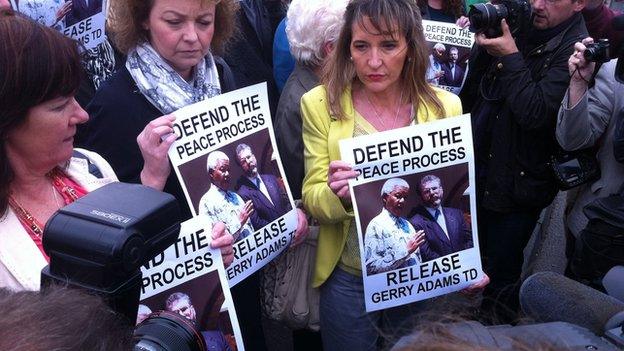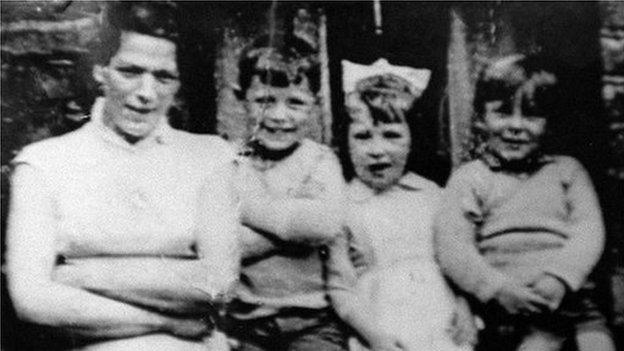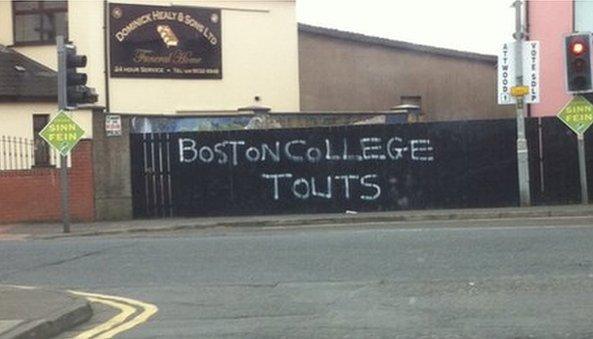Gerry Adams arrest: Attempt to 'settle old scores'
- Published

Senior members of Sinn Féin, including Martina Anderson and Caral Ni Chuilin, attended the rally
The arrest of Sinn Féin leader Gerry Adams is part of an effort by some police officers to "settle old scores", NI's deputy first minister has said.
Mr Adams spent a third night in police custody in connection with the 1972 murder of mother-of-10 Jean McConville. Mr Adams, 65, denies any involvement.
Mr McGuinness referred to "an embittered rump of the old RUC (Royal Ulster Constabulary)".
He was speaking at a rally in west Belfast on Saturday.
Police in Northern Ireland have until 20:00 BST on Sunday to either charge or release Mr Adams, after a judge granted police a 48-hour extension on Friday.
On Saturday afternoon, senior members of Sinn Féin attended the rally at Albert Street off the Falls Road in Mr Adams former constituency of west Belfast, seeking the release of Mr Adams.
Deputy First Minister Martin McGuinness of Sinn Féin said the crowd was "there to show solidarity" with Mr Adams.
Sinn Féin held a rally in Belfast in support of their leader, as Nick Higham reports
He said: "Allegations contained in books and newspaper articles which the PSNI are presenting to Gerry as evidence that he was in the IRA in the 1970s have been around for 40 years.
"But they are only now trying to use these. Is this not political policing?
"This is a replay of the failed effort in 1978 to charge Gerry with membership [of the IRA]."
He added: "Sinn Féin's negotiations strategy succeeded in achieving new policing arrangements, but we always knew that there remained within the PSNI an embittered rump of the old RUC (Royal Ulster Constabulary).
"These people want to settle old scores, whatever the political cost."
The RUC, external was replaced in 2001 by the Police Service of Northern Ireland.
Mr McGuinness, hinted on Friday that the party may look again at whether it would continue to support the Police Service of Northern Ireland.
On Friday evening, Sinn Féin's Gerry Kelly said there was "a growing anger with every single hour" that Mr Adams was detained.
Speaking outside Antrim police station, where Mr Adams voluntarily presented himself on Wednesday evening, Mr Kelly said: "The arrest was uncalled for and certainly the extension is uncalled for.
'Deliberately timed'
"I was out canvassing last night and the anger was palpable - I'm getting this on the doors from people, not all of whom are Sinn Féin voters."
Sinn Féin has claimed the arrest was deliberately timed ahead of elections in three weeks' time. The Democratic Unionist Party (DUP) said it showed no-one was above the law.
Baroness Nuala O'Loan, a former police ombudsman who investigated Jean McConville's murder, denied the service had become politicised.

Jean McConville, a widowed mother of 10, was abducted and murdered by the IRA in December 1972
"Certainly in a post-conflict situation there are problems with every aspect of society," she said.
"But I don't think they're a cabal. I think that's inappropriate language to use. I think that what we need above all in Northern Ireland is that the rule of law should apply equally throughout the country.
"For people to suggest that some people perhaps shouldn't be arrested is perhaps a little questionable."
Secretly buried
Mr Adams is the former MP for West Belfast and is currently an elected representative for County Louth in the Republic of Ireland.
Mrs McConville, a 37-year-old widow and mother of 10, was abducted and shot by the IRA. Her body was recovered from a beach in County Louth in 2003.
She is one of Northern Ireland's Disappeared, those who were abducted, murdered and buried in secret by republicans during the Troubles.
She was kidnapped in front of her children after being wrongly accused of being an informer - a claim that was dismissed after an official investigation by the Northern Ireland Police Ombudsman.

Graffiti referencing Boston College was daubed on a wall in west Belfast
Last month, Ivor Bell, 77, a leader in the Provisional IRA in the 1970s, was charged with aiding and abetting the murder, and there have also been a number of other arrests recently.
The case against Mr Bell is based on an interview he allegedly gave to researchers at Boston College in the US.
The Boston College tapes are a series of candid, confessional interviews with former loyalist and republican paramilitaries, designed to be an oral history of the Troubles.
The paramilitaries were told the tapes would only be made public after their deaths. However, after a series of court cases in the United States, some of the content has been handed over to the authorities.
At least one interviewee implicated Mr Adams in the murder of Mrs McConville. He has always strenuously denied any involvement.